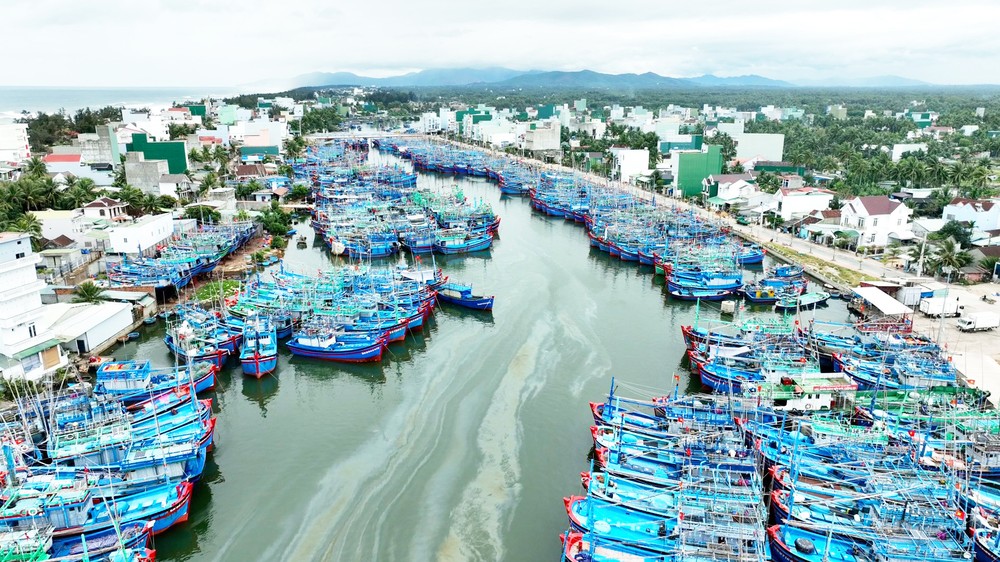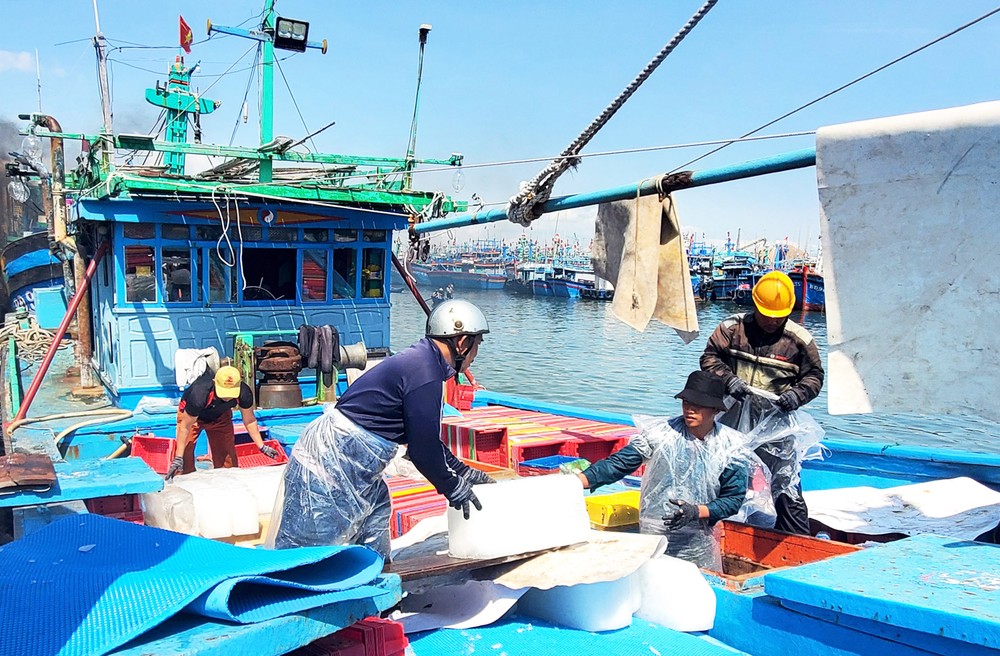
At the beginning of the Year of the Dragon, the demand for offshore fishing surged, exacerbating the severe shortage of maritime workers. Many fishing boats have been forced to stay ashore because they cannot find crew members or set sail without a full crew, leading to numerous challenges during the spring voyages.
Frantic search for crewmates after Tet
On the morning of February 20, at Quy Nhon fishing port in Binh Dinh Province, six offshore fishing boats were busy with loading ice and essential supplies to embark on their voyages at the beginning of the new year. After the Lunar New Year, fisherman Le Van Ta, 55, from Hoai Huong Ward in Hoai Nhon Town, Binh Dinh Province, prepared to set sail with two fishing boats equipped with 700-750 CV engines to fish for tuna and provide support to net-fishing boats in the Truong Sa Archipelago.
When asked about the situation of maritime labor, elderly fisherman Ta sadly lamented that, over the past seven years, fishermen along the South Central Coast have been lamenting due to the dearth of crewmates - maritime workers. This year, in order to secure crewmates for their voyages, every boat has had to pay in advance VND8 million per crew member and VND10 million per helmsman (boat captain) to have enough people to set sail for a month. The workforce mainly comprises individuals aged between 45 and 55, with some even as old as 60, as finding younger crew members is nearly impossible.
Seated by his boat, Vo Thanh Nhat, 51, from Hoai Nhon Town, the owner of the BD 96902 TS fishing vessel, expressed his worries, "To ensure enough crewmates for the voyage at the beginning of the year, I have to spend hundreds of millions of Vietnamese dong. Even with the funds, it is uncertain whether we can find crewmates because labor brokers have monopolized them. Many boat owners are forced to pay an additional VND500,000 per person to secure crewmates."
At Sa Ky seaport in Quang Ngai Province, many boat owners, unable to find maritime workers locally, must venture into neighboring provinces such as Binh Thuan, Khanh Hoa, Binh Dinh, and Phu Yen to hire crewmates. However, they face high deposit requirements. At seaports in Quang Binh, Ha Tinh, Nghe An, and Thanh Hoa, boat owners also complain about the shortage of maritime labor.
At Canh Duong seaport in Quang Trach District, Quang Binh Province, many boat owners noted that most young fishermen are engaged in overseas labor in countries like South Korea, Taiwan, Japan, and Australia, leading to a plight for many boats at the start of the year.

Quynh Lap Commune of Hoang Mai Town is among the areas boasting the largest offshore fishing fleets in Nghe An Province. After Tet, many offshore fishing vessels have been experiencing a "crisis" as the majority of young workers have migrated for employment abroad in countries such as Germany, Taiwan, and South Korea. According to surveys, among the over 130 offshore fishing vessels in Quynh Lap, up to 30 boats are currently stranded ashore, unable to set sail due to labor shortages.
Addressing maritime labor shortage proved to be challenging
Mr. Phan Van Hai, Chairman of the Fisheries Association in Quynh Lap Commune, heads the largest fleet in the area, comprising seven offshore fishing vessels. Each vessel employs an average of 7-8 workers and sets sail from the 6th day of the Lunar New Year. Currently, they are fishing for Sardinella, squid, and other fish species in the Gulf of Tonkin, with plans to move to the Hoang Sa fishing grounds in the second lunar month. To retain their crew, Hai's family pays wages ranging from VND10 million to VND15-16 million per month.
According to Mr. Nguyen Van Muoi, Director of the Fisheries Sub-Department of Quang Ngai Province, the main reason for the maritime labor shortage in the region is the challenging and low-paying working conditions. Some maritime workers have opted to work for companies or in other industries. Binh Dinh Province has a large offshore fishing fleet of over 3,200 vessels, which requires nearly 30,000 offshore workers. However, there is currently a significant shortage of labor. Many fishing boats in Binh Dinh set sail with only five crew members, including one captain and two to three engineers. Hoai Nhon Town (Binh Dinh) is the largest offshore fishing hub in the Central region, boasting 2,200 vessels, including 1,000 dedicated to tuna fishing. However, over the past seven years, the strain from the maritime labor shortage and declining resources has placed the tuna fishing fleet in Hoai Nhon in a difficult situation, with continuous losses prompting some boats to stay ashore or explore alternative livelihoods.
"The maritime labor shortage compels boat owners to incur significant additional expenses to hire crewmates, even resorting to hiring inexperienced and unskilled workers from other provinces, resulting in various consequences and risks," shared Mr. Tran Van Phuc, Director of the Department of Agriculture and Rural Development of Binh Dinh Province.
Binh Thuan is one of Vietnam's three key fishing grounds, and after each Tet holiday, boat owners scramble to find maritime labor. Despite favorable weather conditions in late February, many boats at major ports in Binh Thuan, such as Phan Thiet, La Gi, and Tuy Phong, are unable to set sail due to a lack of crewmates.
At the beginning of the Year of the Dragon, boat owner Nguyen The Hien, from Phan Ri Cua Town, Tuy Phong District, Binh Thuan Province, planned to set sail with 12 crew members. However, nearing the departure date, Hien had to search everywhere to find crewmates as six workers refused to go. At Phan Thiet fishing port, many boat owners have had to accept inexperienced workers or mobilize family members to ensure their fishing trips could proceed as planned. Despite the frantic search for labor, numerous fishing boats remain docked as crewmates remain unavailable.
























